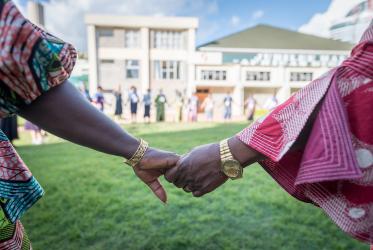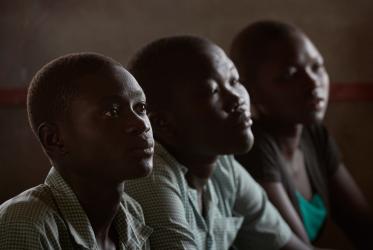In 2018 we celebrate the 70th anniversary of the World Council of Churches. In order to create a lively firsthand account of the ecumenical fellowship and of our shared journey, member churches have contributed stories of people, events, achievements and even failures, all of which have deepened our collective search for Christian unity.
This story was written by Odd Evjen, Norwegian Church Aid (NCA) senior advisor.
Any views or opinions expressed in this article are those of the authors, and do not necessarily reflect the policies of the World Council of Churches.
In 2003, the Darfur conflict resulted in the displacement of millions and an urgent need for humanitarian assistance.
For the first time, Action by Churches Together (ACT) – an organization that was formed from the World Council of Churches’ (WCC) humanitarian ministries, working under the name “ACT International”, and that merged in 2010 with ACT Development to become today’s ACT Alliance – and Caritas Internationalis decided to unite in response to a conflict.
That was the start of the Darfur programme. Now, 14 years later, the two diaconal partners still are united in unconditional support of the people of Darfur, a largely Muslim population.
This joint response remains a unique ecumenical humanitarian program. ACT Alliance and Caritas Internationalis have not yet managed to reproduce other large-scale cooperative efforts. Yet, the programme offers key learnings on and experiences of cooperation between the two networks. The experiences from Darfur are of great value at the international as well as the national and local levels in both immediate and complex, protracted humanitarian crises.
The response also offers significant learnings of practical interfaith action in a location with a local community where one faith is predominant. The programme’s national partner is the Sudan Council of Churches (SCC) and its humanitarian and development wing, ERRADA (Ecumenical Relief Rehabilitation and Development Agency). To date, more than 86 ACT and Caritas Internationalis members have supported the ACT/Caritas Darfur Programme, which has been able to reach out across the Darfurian society, working with women and men, settled communities and nomads and internally displaced persons (IDPs), and both official and traditional governance structures.
Place of crisis and refuge
Almost fifteen years after the initial crisis, more than 3 million people in Darfur are still in need of humanitarian assistance, including 2.1 million IDPs and more than half a million vulnerable resident households. Despite already precarious conditions, this place of crisis has also become a place of refuge – since 2013, over 460,000 South Sudanese refugees have arrived in Sudan, of which over 180,000 in 2017 alone. Approximately 1.1 million IDPs and close to 46,000 refugees from South Sudan now live in South and Central Darfur where the ACT/Caritas Darfur Programme is implemented.
The government, as well as all humanitarian actors agree on the need to pursue strategies of “durable solutions,” in which the IDPs have effectively overcome the need for assistance that was caused by displacement, and conditions are conducive to return or permanent settlement. However, the core challenge faced by the population is still insecurity in the form of conflict and banditry. Equitable access to health and education also remain key challenges.
On top of this, climate change aggravates the burden of the vulnerable population, triggering further tensions due to environmental stress, and food and water insecurity. Sudan is one of the most rapidly warming locations on the globe. While temperatures increase, the regular rainfall fails to appear.
In 2017, the ACT/Caritas Darfur Programme provided vital services to nearly 500,000 people. The main target group of the programme is IDPs in various camps. However, as camps are adjacent to host communities, both groups are in need of assistance. This is rooted in the principle of “do no harm”, which is fundamental to such humanitarian efforts.
The programme consists of five different sectors: water, sanitation and hygiene (WASH); livelihoods; health and nutrition; education; and emergency preparedness and response. In addition, the programme puts significant emphasis on building the capacity of national partners and national staff.
Long-term approaches
Since 2018, a three-year, joint ACT and Caritas Internationalis appeal has been focusing on accompanying the vulnerable and displaced communities of Darfur to enhance their inherent capacities for resilience to the recurring crisis. This implies a deliberate strategic choice: to seek ways to reduce short-term service delivery approaches and to move towards more long-term approaches that support the nexus between humanitarian and development assistance, guided primarily by the needs, rights and preferences of the communities themselves.
A cornerstone of the joint appeal is a defined partnership strategy that aims to accompany and strengthen the capacities of the national partners as result of both networks’ commitment to the global “Charter for Change – Localisation of Humanitarian Aid” agenda.
On the international scene, the Darfur crisis remains a largely forgotten crisis – with subsequent dwindling funding responses. For the 3 million men, women, youth and children of Darfur, the crisis remains existential. For more than fourteen years, they have suffered the impacts of the conflict.
Witness of Christian unity
A key trait of the collaboration between ACT, with its roots in the WCC and organic ties to WCC member churches, and Caritas Internationalis is that both are rooted in an identity of ecumenical response which understands diakonia as a way of centering the mission of the church “on the margins.” For this reason, both networks remain committed to continue supporting the Darfurian people and not allowing their experience of lives lived in crisis to be forgotten.
The diaconal cooperation between the Roman Catholic humanitarian ministries and those of the WCC member churches remains a powerful witness to the Christian unity possible in diakonia.







